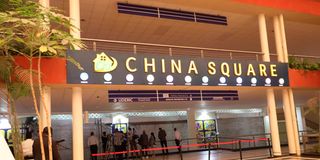Govt agency releases Sh50 million ‘fake’ goods seized at China Square

China Square in Nairobi, as pictured on February 27, 2023. The Chinese-owned supermarket has closed its doors indefinitely amid an uproar from competitors over low-priced goods.
The Anti-Counterfeit Authority (ACA) has released goods worth Sh50 million that were seized at China Square over claims that they were fake Finder Tools.
The agency released the goods after the complainant, Smithmo Company Ltd, which had suspected the sale of counterfeit Finder Tools at the outlet, withdrew its complaint.
According to the agency’s executive director, Dr Robi Mbugua Njoroge, the goods were released after they were confirmed to be original and had been "sourced from the same manufacturer and international brand owner of Finder Merchandise".
The goods were seized on Thursday, February 16, after Smithmo lodged a complaint with ACA.
“We would like to inform the public that the complainant, in a letter dated February 27, wrote to ACA and requested to withdraw the complaint against China Square,” Mr Njoroge said in a statement.
“In light of this new information, ACA conducted a thorough investigation and verified the source of the goods and we can confirm that they are authentic Finder Tools. As such, we have released the goods to the rightful owner.”
The return of the goods comes a day after the Chinese embassy in Kenya broke its silence over the controversy surrounding China Square, a Chinese-owned retailer in Nairobi.
In a statement on Wednesday, the embassy said it had taken note of the situation and called on the Kenyan Government to intervene and protect Chinese enterprises and Chinese citizens amid the unfolding controversy.
“We would like to reiterate that the embassy supports deepening trade and investment cooperation between China and Kenya, and supports Chinese enterprises and Chinese citizens in conducting business in accordance with Kenyan laws and regulations,” the embassy said.
The Chinese statement came after a series of protests by Nyamakima area traders in Nairobi’s Central Business District.
The local traders insist that they should be in charge of controlling the wholesale and retail ends of the supply chain in the country. They accuse the Chinese of taking over the wholesale and retail supply businesses by lowering the prices of their commodities by up to 45 per cent.
Counterfeits
When the Nation.Africa exclusively unveiled Mr Lei Cheng alias Charlie — the Chinese businessman and director of China Square that Gikomba traders now claim is eating their lunch by slashing commodity prices by almost half and cutting them off from the market — he was a happy man.
Happy because his business was reportedly raking in Sh10 million daily, with 130 employees at the Kenyatta University-owned Unicity Mall on Thika Superhighway.
Also Read: Inside the jinxed Kenyatta University mall
Set up in January, China Square became a hit with Nairobians for its low-priced items. This did not go down well with the Nyamakima traders.
Trade Cabinet Secretary Moses Kuria had asked the Kenyatta University vice-chancellor to buy out Mr Lei’s lease and hand it over to the Gikomba, Nyamakima, Muthurwa and Eastleigh traders, and potentially edge out the Chinese businessman.
On Monday, Mr Lei, who temporarily closed his business on Sunday, told the Nation in an interview that he is not even sure when he will reopen China Square because the government, through the ACA, said it was investigating it over non-compliance after one of the suppliers complained about fakes.
“We have an active case that we are investigating against China Square after a Chinese manufacturing company called Finder claimed that their products had been counterfeited by China Square and that they have infringed on their intellectual property,” Mr Tom Muteti, the communications manager at ACA, said in an interview on Monday.
However, Mr Lei claimed the counterfeits angle was a political witch-hunt to kick him out of business and out of Kenya, adding that the row between China Square and Finder was a business misunderstanding that had since been resolved.
“Finder issue was resolved by the Finder brand company in China. It was just some misunderstanding,” Mr Lei said.





